When Donald Trump is inaugurated as president for the second time in January 2025, he will assume power over the regulation of a tech industry that’s changed significantly since his first term began in 2017. The tech industry’s honeymoon period with the US government has fizzled, and both Trump and his successor, President Joe Biden, took a skeptical stance toward tech CEOs, albeit for different reasons. Their antitrust enforcers initiated some of the first major anti-tech monopoly actions in decades.
Technology
What a second Trump presidency means for tech
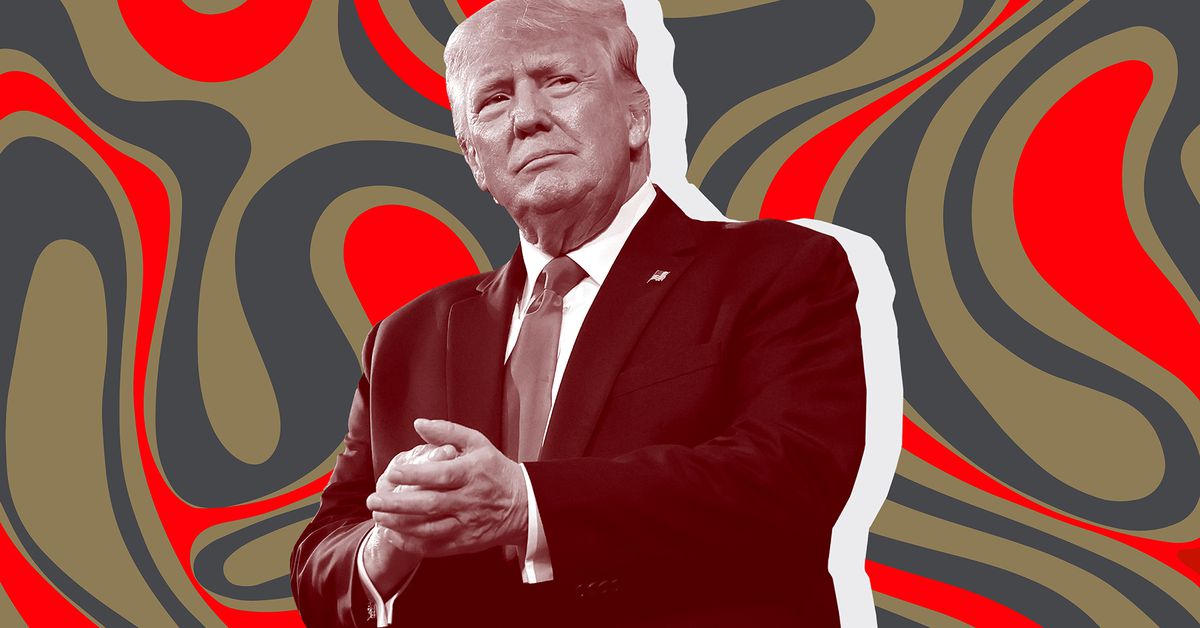
Now, the tech industry has wised up. Most CEOs have looked back at the last eight years of techlash and seemed to conclude that they should be as visibly apolitical as possible — though they’re happy to lobby behind the scenes. At the same time, some have gambled that being in Trump’s good graces would be beneficial — and that risk seems to have paid off. Meta CEO Mark Zuckerberg, who Trump has literally threatened to send to prison, praised the president-elect’s fist pump after the attempted assassination and has made nice with Republicans about Meta’s content moderation choices. Amazon founder and Washington Post owner Jeff Bezos killed an endorsement of Kamala Harris in the paper. And, of course, Tesla CEO and X owner Elon Musk has made himself one of Trump’s chief allies, securing a promise that he could run a “Department of Government Efficiency” (DOGE).
Trump, meanwhile, will have more power than ever — he’s rooted out former supporters who encouraged restraint during his first term, and key allies have sprawling plans for overhauling the administrative state.
All this to say, the next four years of tech policy will be unpredictable and erratic. But even as Trump tries to expand his authority, he’ll need support from the courts and Congress. These are the policies we’ll be tracking as Trump reassumes the presidency and what he could realistically do.
AI
A Trump presidency likely means a less constrained AI industry. Trump has promised to repeal the Biden administration’s AI executive order, which instructed agencies to create testing standards and guardrails to prevent AI from being used in discriminatory ways, like in allocating housing or determining legal outcomes in the criminal justice system. Trump previously signed his own executive order covering AI safety and standards, but it did not touch on discrimination. The second Trump administration will likely deprioritize AI discrimination safeguards and discourage the use of the Defense Production Act to require more transparency, something conservatives have characterized as government overreach.
AI policy is an area where Elon Musk will likely seek to exert his influence, assuming he and Trump remain on good terms. Musk runs xAI and has been critical of incumbent players like OpenAI — a firm he cofounded but later distanced himself from and sued. Musk has supported AI safety measures like California’s controversial and ultimately vetoed SB 1047, and he previously signed a call for a moratorium on major AI developments for safety reasons. But his focus on existential risks has been criticized by some AI researchers as a distraction from more immediate risks like discrimination.
AI policy is an area where Musk will likely seek to exert his influence
It’s also not yet clear how Trump will handle thorny copyright issues surrounding generative AI, including what information large language models are allowed to train on. AI executives, including Musk, could seek to shape how Trump views the issue in a way that’s favorable to them.
Antitrust
Trump’s approach to antitrust enforcement could be based mainly on personal grievances. Bloomberg Intelligence senior litigation analyst Jennifer Rie writes that “enforcement could be idiosyncratic based on president-elect Donald Trump’s view of the companies or industries involved.” Adam Kovacevich, CEO of the left-of-center tech industry group Chamber of Progress, bluntly said we’ll see a “‘Trump Welfare Standard’: is this company nice to Trump?”
Though Trump’s VP pick, JD Vance, has publicly praised Federal Trade Commission Chair Lina Khan, it’s not clear how committed Vance is to this stance or how much sway he will have. If he does get a say here, we could expect a continued crackdown on big tech firms to benefit “little tech” or startups that VCs like Andreessen Horowitz (another Trump supporter) want to see rocket with growth.
“Republicans no longer uniformly lean more business-friendly than Democrats.”
While business leaders may be relieved if Khan leaves the FTC, Rie says we shouldn’t expect “a return to the relaxed antitrust climate of 10 years ago … some aspects of the current aggressive approach will stick. Republicans no longer uniformly lean more business-friendly than Democrats.” Still, while she says it largely depends on Trump’s appointments, merger approvals could become swifter and recently revised merger guidelines could be unraveled.
Trump’s administration will likely continue the existing legal fights against Meta, Google, Apple, and Amazon (including two cases filed during Trump’s first term). But it could pursue more modest remedies, depending on who he appoints — and how Trump feels about a company like Google on any given day. “A slight increase in settlement prospects is possible down the road, especially if the cases don’t seem to be going well for the agencies,” Rie writes. “Trump doesn’t believe Google should be broken up, though we didn’t expect this to happen anyway.” Kovacevich also says Trump could use the cases “as leverage over the companies to get favorable treatment on speech and content concerns.”
TikTok
Perhaps Trump’s greatest flip-flop issue has been his stance on TikTok. Trump championed the original TikTok ban effort, which was shot down by the courts. But he’s more recently said he opposes a ban because it would just benefit Meta. Trump’s turnaround reportedly came after he met with Republican donor Jeff Yass, who has a major stake in ByteDance.
Under the Biden administration, Congress overwhelmingly passed a bill that could ban the social video app unless ByteDance divests it by mid-January, and Biden signed it into law. The DC Circuit Court of Appeals is currently deliberating about whether that law can be upheld and will likely release a decision by the end of the year. But TikTok’s chances of dodging a ban only “slightly” improve under a Trump presidency, according to Bloomberg Intelligence litigation analyst Matt Schettenhelm.
The law doesn’t give Trump “much room” to play with
If the DC Circuit decides to uphold the law and the Supreme Court declines to take it up or upholds that ruling, what Trump can do is somewhat limited. He could grant an extension of up to 90 days for ByteDance to complete its divestiture of TikTok, but under the law, he would need to certify to Congress that there’s an actual plan underway. The law does leave the president some discretion to determine whether more apps besides TikTok fall under the divestiture law’s purview and what represents an adequate separation. But TikTok is written into the statute, so Trump can’t just decide it no longer applies.
The law doesn’t give Trump “much room” to play with, Schettenhelm tells The Verge in an email, though he could exercise some judgment in approving TikTok’s divestiture proposal. Even if Trump took the “unusual” step of announcing his Justice Department wouldn’t enforce the law, Schettenhelm writes in a note to clients, “companies that carry the app would be undertaking enormous risk that Trump wouldn’t change his mind and seek crippling penalties. We doubt they’d do so.”
If the court strikes down the law — perhaps because it finds it violates the First Amendment or because Congress didn’t develop a strong enough record in the relatively quick lead-up to its passage — then the legislature would need to do the process over. While the bill had very strong bipartisan support the first time around, now that Trump has said he opposes a TikTok ban, it seems less likely Congress would spend valuable time on a bill that the president may not sign.
Tariffs and China
Trump famously started a trade war with China in his first term in office, and if his campaign rhetoric is to be believed, we’ll see a continuation of such economic policies this time. While Biden has implemented some protectionist economic policies, including export controls on advanced semiconductors, Trump has floated tariffs on goods imported from China at a rate of 60 to 100 percent.
That could have big implications for the many tech companies that use components made in China and for any companies that rely on China for a significant part of their business strategy (like Apple and Tesla). But because of that connection, this is another area where Elon Musk’s influence could be a wild card.
Alongside his promises of mass deportations, Trump’s China tariffs could dramatically change day-to-day life in America, as severe price hikes for imported goods would throw countless people’s lives and livelihoods into chaos. How far the administration will go is an open question, and one that makes predicting the future with any certainty — inside and outside the tech industry — difficult to do.
Net neutrality and telecom policy
Net neutrality — which already faces an uphill battle in the courts after SCOTUS rolled back Chevron deference — is likely dead under a Trump administration. Bloomberg Intelligence analyst Nathan Dean predicts a 90 percent chance Trump’s Federal Communications Commission abandons the effort to reclassify broadband providers as common carriers and subject them to greater regulatory scrutiny.
A Republican-led FCC will also likely allow more concentrated control of TV stations, Dean writes, and loosen broadcast merger and acquisition rules. Republican FCC commissioner Brendan Carr, who served during the first Trump administration, has called for big tech companies to pay into the Universal Service Fund — currently funded by telecommunications providers — and suggested punishing TV networks under broadcasting rules.
Musk could seek to limit programs that help Starlink’s competitors
It’s not totally clear yet how Trump’s FCC will handle other key broadband policy issues, including the rollout of the government’s Broadband Equity, Access, and Deployment (BEAD) infrastructure investment program. But once again, Elon Musk’s influence could become important here. Musk runs the satellite internet company Starlink, which has been passed over for some government contracts, but could lobby for more favorable policies under Trump. For example, the BEAD program currently favors fiber broadband, and Musk has critiqued the program as an “outrageous waste of taxpayer money.”
In his government efficiency role or in a more informal way, Musk could seek to limit programs that help Starlink’s competitors, like the Universal Service Fund, according to CNET. That program helps service rural communities with broadband — places where Starlink is well positioned to move in.
Content moderation
Conservatives including Trump have long complained about social media platforms suppressing conservative speech and accused them of bowing to Democratic government pressure to remove things like election or vaccine misinformation. Even before his reelection, platforms like Meta had heeded Republican pushback and loosened their moderation standards.
A Trump administration and Republican legislature could rework the Section 230 liability shield to let them actually punish companies for moderation decisions. In addition to the option of passing actual laws changing Section 230, Brendan Carr suggested in his Project 2025 chapter that the FCC could narrow its protections for a broad range of content moderation decisions. Ultimately, any executive or legislative changes to online speech rules could face the Supreme Court, which has so far upheld the right to conduct content moderation, although it signaled openness to potential legal changes in the future.
Kids online safety
Trump hasn’t said much about where he stands on this topic or on the leading congressional bill on the subject, the Kids Online Safety Act (KOSA). That bill remains stalled in the House after passing through the Senate (in combination with an update to children’s data privacy law), and it’s not yet clear what could happen in future congressional sessions. Current Republican House leadership has expressed concerns that KOSA could unduly limit speech, so a Democratic House might be more open to giving it floor time, but ultimately, the concerns with the bill don’t fall entirely down partisan lines.
Adam Kovacevich, whose group has opposed KOSA, suggests Democrats should be wary of passing the bill under a Trump presidency — pointing to lead cosponsor Sen. Marsha Blackburn’s (R-TN) comments about protecting kids from transgender content online. “Democrats will have to decide whether they want to hand Trump & MAGA state law enforcers a powerful new censorship tool,” he writes.
Electric vehicles
Electric vehicle tax credits and other climate-focused policies will likely be in jeopardy under Trump, though that might be somewhat complicated by his connection with Musk, with Tesla standing to gain from EV-friendly policies. Still, Wedbush analyst Dan Ives previously said that Tesla’s “scale and scope … could give Musk and Tesla a clear competitive advantage in a non-EV subsidy environment.”
Tesla’s “scale and scope … could give Musk and Tesla a clear competitive advantage in a non-EV subsidy environment”
Bloomberg Intelligence analyst Nathan Dean sees just a 30 percent chance of continued EV tax credits under Trump. He predicts continued rhetoric that EVs are “a boon to China’s economy,” alongside efforts to replace the tax credits with consumer incentives that could benefit traditional carmakers like General Motors, Ford, and Stellantis.
Semiconductor policy
Under the Biden administration, Congress passed the bipartisan CHIPS and Science Act, which injected funds into creating a domestic semiconductor production industry — something experts say is a national security necessity and critical to maintaining control over the supply chain for important technologies including medical tech. But Trump called the bill “so bad” during his appearance on Joe Rogan’s podcast, and soon after, House Speaker Mike Johnson (R-LA) said he was open to repealing the law (though he later walked back those comments). Trump can’t undo a law on his own, but he could perhaps instruct his Commerce Department to slow-walk aspects of its rollout.
Crypto
Trump has made significant overtures to the cryptocurrency industry, headlining a major Bitcoin conference this summer and picking up significant support from prominent crypto investors like Marc Andreessen and Ben Horowitz. With Trump’s election, the industry is likely to get its top wish: the ouster of Securities and Exchange Commission Chair Gary Gensler, whom the industry views as its chief antagonist. Expect more permissive and hands-off regulation of this industry, as Trump has called for making the US a “Bitcoin superpower.”
Technology
Heretic’s directors on crafting their new horror villain: ‘This has to be Hugh Grant’

When codirectors Scott Beck and Bryan Woods started thinking about who could play the antagonist in their new horror flick Heretic, they knew he had to have a few specific characteristics. The film is about a man who lures missionaries into his home, eventually turning a pleasant chat about religion into a nightmare scenario. So he had to be able to disarm with charm and humor, before switching gears to become intense and terrifying. “He had to have these moments of feeling dangerous, of feeling safe, contradictory traits that had to coalesce into something,” says Beck.
Early on in the casting process, the pair landed on a surprising name — and they couldn’t let it go. “As soon as we thought about him we were like: ‘This has to be Hugh Grant,’” says Beck. “That’s the only person we could see in this role, because he checked all of those boxes.”
The idea of putting you at ease is pivotal to the movie and character. Heretic starts out with two young Mormon missionaries — Sister Barnes (Sophie Thatcher) and Sister Paxton (Chloe East) — who approach the wrong house while proselytizing door-to-door. At first, Grant’s Mr. Reed seems completely harmless. He wears a cozy cardigan, stumbles over his words, makes silly jokes, and offers his guests Cokes. His home is filled with the smell of a baking blueberry pie. But eventually, the cracks start to show, and Reed shifts to preaching his own beliefs before moving in a much more sinister direction.
The character was inspired by a mix of real-world figures, including notable atheists like Richard Dawkins and Christopher Hitchens as well as the cult leader Keith Raniere. The directors spent around four months emailing back and forth with Grant, as he picked apart the character, peppering them with questions about Reed’s origins and beliefs. “I think through those conversations the character started getting clearer and clearer to all of us,” Woods explains.
Raniere, in particular, influenced Grant’s take on Reed. Grant “was interested in the word salad that Raniere is capable of conjuring in a way that makes him almost feel smarter than he actually might be,” says Woods. “He also responded to the way he creates the illusion of listening, which makes him seem less threatening.”
The directors believe that Grant’s past work, particularly his early career as a bumbling romantic comedy star, help set the expectation that this isn’t a character to be feared. “Early in his career… he didn’t feel threatening at all in any of those roles,” Beck says. “But as soon as you’re putting him into a movie that has the aspect of a suspense thriller, and he’s starting to challenge in a way that you’ve never quite seen, it weaponizes what we otherwise know of him.” Woods adds, “We’re leaning heavily on his charisma and charm and all the things we know and love him for.”
In a lot of horror movies, it’s hard to believe characters will stick around in a dangerous situation. But in Heretic, you can understand it; the warning signs are subtle at first, and once they become more overt, well, it’s too late. And that’s due to Grant’s ability to showcase both sides of the character so convincingly, making his guests — and viewers — feel initially comfortable.
“We’re leaning heavily on his charisma and charm and all the things we know and love him for.”
“He’s funny and open-minded, he wants to hear what they have to say,” Woods says of the initial dynamic between Mr. Reed and the two missionaries. “There’s this feeling of two young women that are talking to an older man who appears to be very knowledgeable about their religion and all religions. So we buy that they are sitting there and engaging in this topic. And their best play is to politely listen to him and then extricate themselves from the situation.”
There’s another aspect to Grant’s character that makes him scary, something that will be familiar to anyone who spends much time on the internet: he’s a debate bro. The film is about Reed convincing Barnes and Paxton of his own beliefs. Without spoiling the specifics, he holds a particular disdain for nearly all organized religion. The conversation with the missionaries is almost a game. He has studied for a lifetime so that he can anticipate their questions and defeat them with logic. Reed doesn’t have much interest in hearing what the sisters really have to say — he just wants to prove himself right, using all of the characteristics that Grant embodies so well.
“What scares us the most is somebody that approaches something with so much certainty that they’re unwavering,” says Beck. “The great thing about discourse and debates is that you’re actively listening. Something about the movie that we’re excited about is that we can throw in all of these questions and conversation pieces, and Reed can feel like that guy on Reddit.”
Heretic is in theaters on November 8th.
Technology
Trying to get the AMD Ryzen 7 9800X3D CPU? It seems only scalpers have it and they’re jacking up the price
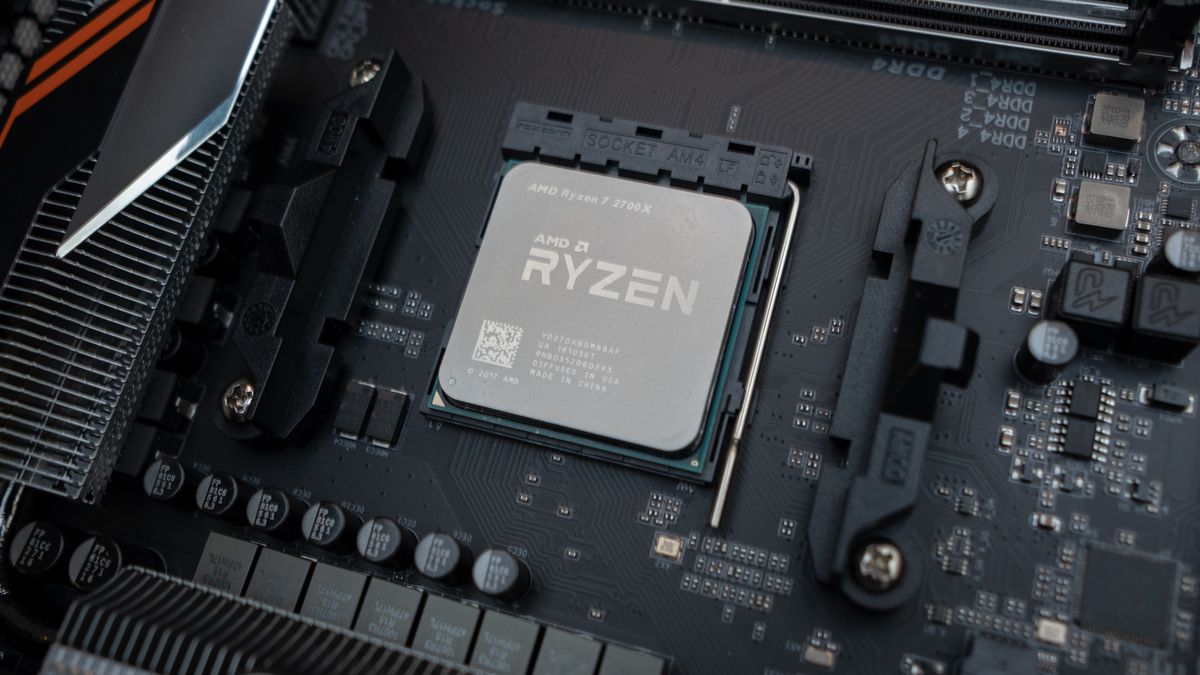
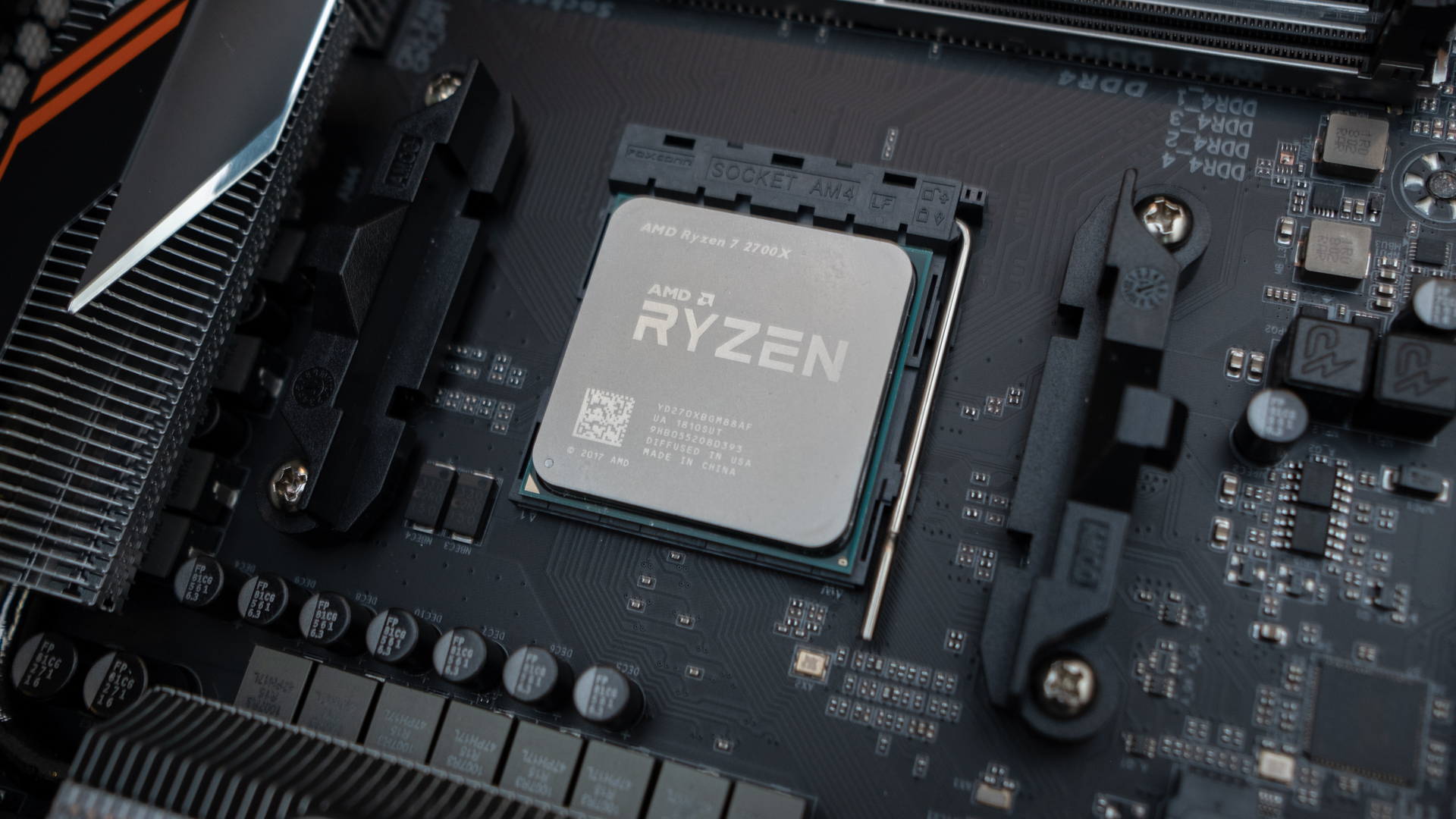
- The AMD Ryzen 7 9800X3D processor sold out in most retailers
- Scalpers have been doubling the prices on preorder listings
- As components sell in waves, this issue will be fixed soon
Trying to get ahold of the AMD Ryzen 7 9800X3D, one of the best processors on the market right now? Good luck, since it’s sold out pretty much everywhere.
According to Digital Trends, just minutes after the first listings went live, they immediately sold out. Naturally, resellers have been capitalizing on this opportunity by selling the “preorders” for a higher price than what they initially paid – in other words, scalping. The retail price is $479 and most of these listings on eBay are $900 and over. Though none of those have sold as of this writing, one buyer recently purchased a chip for $564.
Even we at TechRadar can confirm how difficult it’s been, as we haven’t been able to secure one from a standard retailer as of yet. You can keep checking on online retailers like Amazon, Newegg, and B&H Photo, but of course, they’re all out of stock as of now. Even AMD’s official online store has no stock despite a limit of one per customer.
There is one place you can get your hands on the Ryzen 7 9800X3D and that’s at Micro Center. However, you’ll have to go to its brick-and-mortar store to get your hands on one there right now.
There is another silver lining to this and it’s that scalpers won’t be having the last laugh. As more come back in stock in waves, demand will eventually lower enough to make their jacked-up listings worthless.
This could take another few months for this to happen, so keep checking back with the official retailers until you can get your hands on one too. Some lucky buyers on the AMD subreddit are already celebrating getting a hold of one themselves, so it’s not impossible. Meanwhile, you can also check out more of the best AMD processors if you need your fix now.
Why is the Ryzen 7 9800X3D so sought after?
It’s a little surprising that the Ryzen 7 9800X3D is already garnering a lot of attention, as the rumors and reports have been positive in terms of performance. According to one report, it will have eight Zen 5 cores with a 4.70GHz base clock speed, which can be boosted up to 5.20GHz, 96MB of 3D V-Cache, and may have an 8% performance boost over AMD’s current high-end gaming processor.
In terms of overclocking, pros have been pushing the processor to its limits and finding out it can hit as high as nearly 7GHz for clock speeds. One user ran Counter-Strike 2 at 1080p (max graphics settings) and hit 1,262.9 frames per second (fps). There was another test with Valorant and the CPU averaged close to 1,100 fps at 1080p resolution (maxed-out settings), reaching over 1,500 fps at times.
It’s clear how big this processor is, and why so many scalpers saw a golden opportunity to take advantage of it. But with any large tech launch, given enough patience and anyone who wants it will be able to buy it legitimately in a matter of months, if not sooner.
You might also like
Technology
Sony commits to single-player games in wake of Concord failure


Sony is not giving up on single-player games despite investing a lot into live-service games over the past few years, with plans to release at least one “major” single-player game every year “from next fiscal year onwards.”
The company released its Q2 2024 financial report on Friday, and there was a lot of good news for the video game division despite the high-profile failure of live-service title Concord. Earlier this year. The hero shooter only wracked up a few hundred players on Steam at launch — only 697 concurrent users at peak, according to SteamDB. Sony Interactive Entertainment took the game offline two weeks after launch before eventually sunsetting it and shutting down developer Firewalk Studios.
Sony has also been at the center of issues with Destiny 2 developer Bungie, which laid off more workers this year and restructured to create a new studio inside PlayStation.
However, single-player games have done well for Sony this year. While there haven’t been many first-party releases, the family platformer Astro Bot was a big hit for the company. According to the financials, it’s sold over 1.5 million copies over the first nine weeks. It even managed to convert users, with 37% of Astro Bot buyers not having bought a first-party game from Sony over the past two years. It’s also the highest-rated 2024 game on Metacritic at the time of this writing (tied with Elden Ring: Shadow of the Erdtree).
“We intend to build an optimal title portfolio during the current midrange plan period that combines single-player games, which are our strength, and which have a higher predictability of becoming hits due to our proven IP, with live service games that pursue upside while taking on a certain amount of risk upon release,” the presentation transcript reads.
So basically, Sony will continue to release big single-player games based on their established IP, like Ghost of Yotei, the sequel to Ghost of Tsushima, Death Stranding 2: On the Beach, and Marvel’s Wolverine. While the company hasn’t officially announced other games that would fit in this category, fans can be on the lookout for another Final Fantasy 7 Remake entry, another God of War title, a game to cap off the Horizon trilogy, and more Marvel titles as reported in the Insomniac Games leak.
It’ll also retool its live-service strategy a bit, with the company “improving our live service game processes” and sharing lessons it learned from Concord‘s development and shutdown.
The company has also been riding sales of Marvel’s Spider-Man 2. And while Helldivers 2 is a live-service shooter, it’s been a big hit for Sony on both PC and PlayStation 5.
Technology
Get the Galaxy Watch Ultra for as low as $250

Samsung’s Galaxy Watch Ultra is perhaps the best smartwatch available for outdoor enthusiasts who use an Android device, and right now you can pick it up for a pretty good price thanks to Samsung’s current deal on the watch. Normally the Galaxy Watch Ultra would cost you $649.99 if you were paying full price, but at the moment you can get the watch for as low as $250.
There are some caveats to this super low price though. Right off the bat you get a $50 discount as Samsung has the watch on sale for $599.99. On top of this, you can save up to another $350 with an immediate trade-in credit. So you won’t be guaranteed to get the Galaxy Watch Ultra for $250. That price is dependent on what the value for your trade-in device is. That being said, any trade-in credit is going to save you money on the Galaxy Watch Ultra purchase and that money will be deducted from the total end cost of the watch at checkout.
All-in-all, a great deal, and really the best price we’ve seen for the watch since it was launched. Samsung’s Galaxy watch Ultra has plenty of awesome features but one that really stands out from other Wear OS smartwatches is the Quick Button on the right-hand side. With this button you can assign any number of actions you can think of and quickly launch into that function with a single press. So it’s all about convenience.
The Galaxy Watch Ultra is a bigger watch with a noticeably heavier weight compared to the Galaxy Watch 7, though. So that’s worth keeping in mind. However, the Galaxy Watch Ultra was also built to be rugged, and has a titanium case. So it will stand up better to dings and such.
Technology
Black people across the country have been getting racist texts about slave plantations
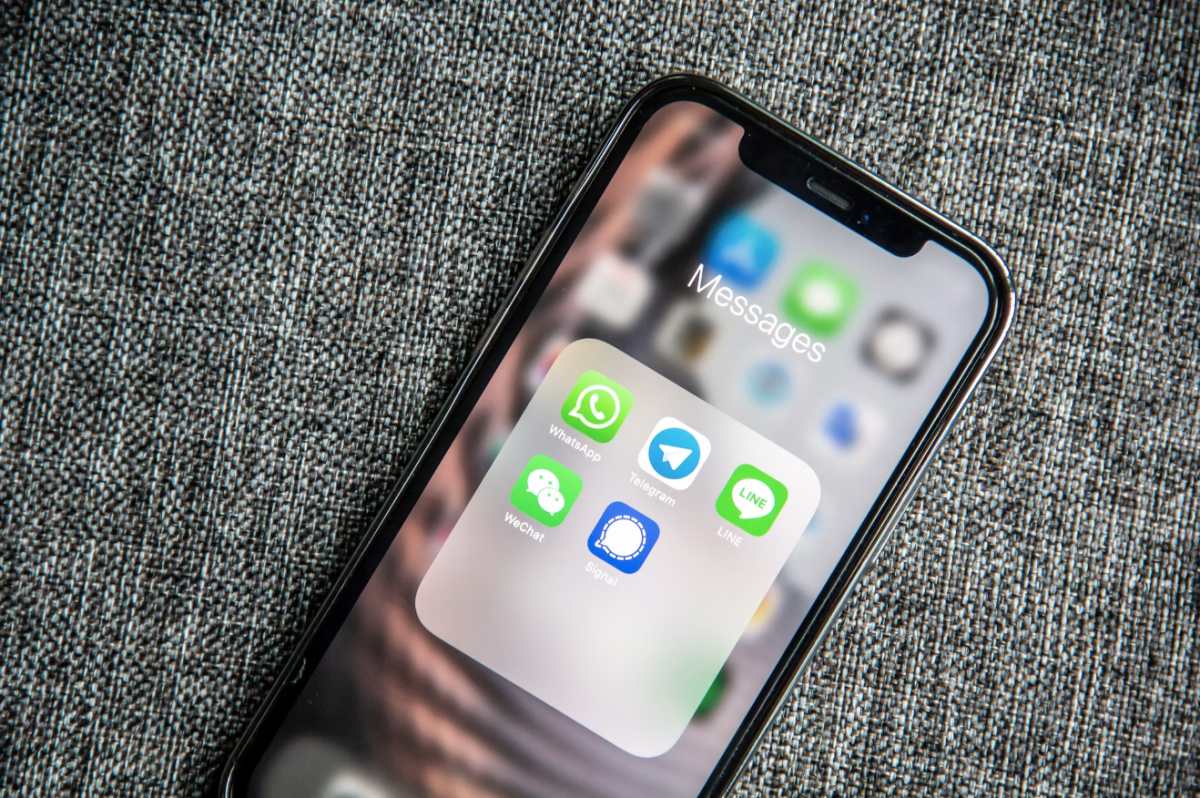
Black people throughout the country, in more than 20 states, have been getting racist text messages that order them to report to a plantation for slave labor, and numerous other outlets. The texts reference “slave catchers” and “picking cotton,” in addition to warning the recipients that they will be searched upon arrival.
These hate-filled messages have been received by both kids and adults. The “texts appear to be targeting Black and Brown individuals, including students,” New York’s attorney general Letitia James said. Various AG offices from other states have also issued statements.
The texts all come from unknown phone numbers and began ramping after the election on Tuesday. NAACP president Derrick Johnson said that “these messages represent an alarming increase in vile and abhorrent rhetoric from racist groups across the country, who now feel emboldened to spread hate and stoke the flames of fear that many of us are feeling after Tuesday’s election results.”
The mother of a University of Alabama student who received one of the messages said that “it’s eerie that it’s the day after the election. It’s eerie that it came to my daughter’s personal phone. It’s eerie that it’s only going to Black students.”
A spokesperson for Donald Trump’s presidential campaign wrote in a statement that it “has absolutely nothing to do with these text messages.” The FBI in a statement, noting that it’s been in “contact with the Justice Department and other federal authorities on the matter.”
It remains unclear who sent the texts and how they did it. The messages targeted people of color, suggesting that the senders had biographical information on the recipients. Many of the messages were sent through TextNow, a free app that provides phone numbers, texting and calling services.
TextNow told CNN that it believes this is a “widespread, coordinated attack.” The service lets people sign up anonymously and sends texts via randomly-generated phone numbers. It says it has been busy “rapidly disabling the related accounts.” The company is also “working alongside our industry partners to uncover more details and continue to monitor patterns to actively block any new accounts attempting to send these messages.”
If you have received one of these horrific texts, lawmakers encourage you to reach out to your state’s AG or email . It’s currently unknown how many people have received the messages.
Technology
Amazon Games talks IP growth opportunities across five generations of gamers
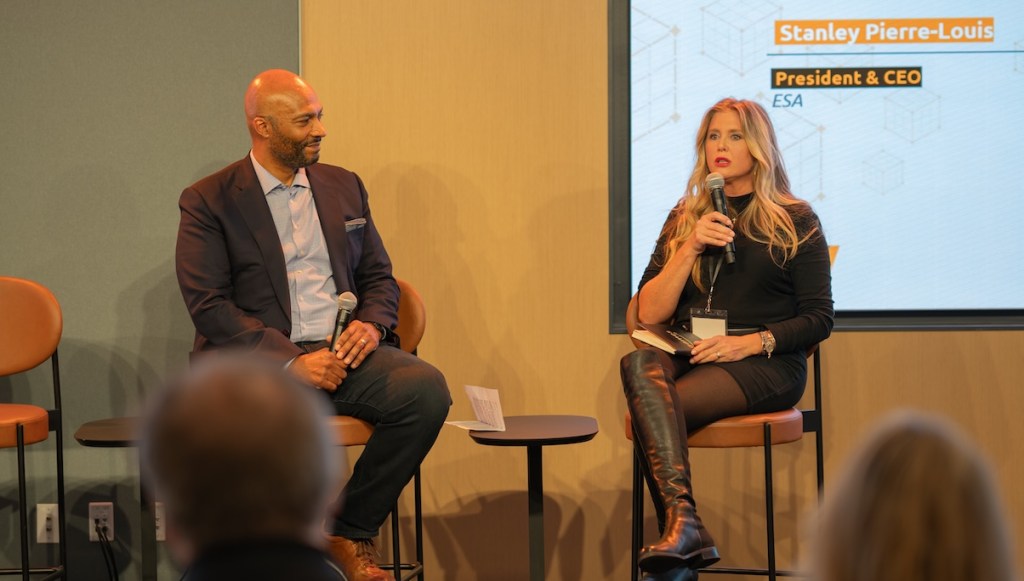
The goal of Amazon Games, the game publishing and development arm of Amazon, is to become a world-class top publisher in the game industry, says Laura Naviaux Sturr, GM, Operations, Amazon Games. The studio has launched three chart-topping titles so far: New World, Lost Ark, and Throne and Liberty.
At GameBeat Next, Naviaux Sturr spoke with Stanley Pierre-Louis, president and CEO, Entertainment Software Association (ESA), about the studio’s future portfolio and the ways its investments will come to bear over the next three years. That includes titles like the upcoming action brawler King of Meat and a new collaboration with Maverick Games on a future narrative-led, open-world driving adventure game, and big-swing investments in IP like Tomb Raider and The Lord of the Rings — and looking for breakout opportunities.
“The industry is at an inflection point right now,” she said. “We want to take two to three big bets a year and figure out the ones we can dial up a few notches. In our portfolio strategy, we need the blue chips with the dividends, some growth opportunities and engines and then taking some fun experimental bets. If you fast forward 10 years from now, what is Gen Alpha and Gen Z expecting from their gameplay experiences?”
Generating growth through IP
Media giants like Warner, Disney, and even Netflix are seeing great success exploiting their IP across media streams, and that’s a big part of the Amazon Games’ strategy. They’re all growing IP to take to transmedia, as well as leap at opportunities to secure established IP.
“Big IP will always matter, always carry with it this extraordinary fandom,” Naviaux Sturr said. “The big ones in the video game world are trying to get that commentary out of the depths of the internet into real-life experiences or through film and television or theme parks, like what you see with some of the very biggest video game IP. That’s an interesting vector in terms of finding new growth.”
For nascent video game IP, careful planning is crucial during the creation process, such as giving secondary characters potential for their own stories, considering what a prequel might entail, making sure the story could move throughout the timeline of your world in a compelling way and more.
“It’s more of the franchise planning at the outset that I’m seeing developers be very smart and strategic about. Look at how IP is being invented from the corners of the internet,” she said. “You have the Alexa Fund as an early investment vehicle at Amazon. We invested in a company called Superplastic. Their whole thesis was, how do we take Unreal and this ubiquitous technology that presumably will become very common, a skill set that a lot of developers have, and invent IP through social media?”
Demographics, attitudes and IP
In this year’s ESA study, “Essential Facts About the U.S. Video Game Industry,” they looked at Gen Alpha’s playing dynamics for the first time, and found that 79% percent play video games, with Gen Z’s numbers not far behind at 76% — a massive addressable market of people who love games. The average age of gamers is increasing over time, suggesting that more and more folks are lifelong gamers, playing not only new titles, but the titles they grew up with. Bringing those consumers along the journey of an IP they love requires some strategy, Naviaux Sturr says, which depends on the maturity of the franchise, consumer expectations and what the fans want.
With early-stage IP, there’s a lot more flexibility in the ways that you can expand and grow. But big IP holders like Roblox and Amazon Games, which see players across generations, have hard decisions ahead of them about how much player agency you’re going to allow this generation to have with your IP.
“In these user-generated worlds, micro-communities playing with a few people, watch parties — they expect to be able to have different rule sets and modify the game and do that in a way that feels very modern, seamless and easy,” she said. “For most of them, the common denominators are that they’re online, they play highly social experiences, and typically competitive ones, and some form of PvP (player vs. player). It’s my personal belief that this will still be their expectation 10, 20, 30 years from now.”
But she points at other statistics like the 53% of gamers who want single-player experiences. Addressing those consumers will require developers to challenge conventions: does every single-player game have to be 30 hours long, or have a single ending, and so on, and what will these games look like in the future?
“Our capital is always in terms of long-term value creation,” Naviaux Sturr said. “We’re taking that long view in making these stories, characters and narratives, and allowing them to come into these various spaces, whether through transmedia or the game itself, and telling new stories that wouldn’t have been possible otherwise.”
-

 Science & Environment2 months ago
Science & Environment2 months agoHow to unsnarl a tangle of threads, according to physics
-

 Technology1 month ago
Technology1 month agoIs sharing your smartphone PIN part of a healthy relationship?
-

 Science & Environment2 months ago
Science & Environment2 months agoHyperelastic gel is one of the stretchiest materials known to science
-

 Science & Environment2 months ago
Science & Environment2 months ago‘Running of the bulls’ festival crowds move like charged particles
-

 Technology2 months ago
Technology2 months agoWould-be reality TV contestants ‘not looking real’
-

 Science & Environment1 month ago
Science & Environment1 month agoX-rays reveal half-billion-year-old insect ancestor
-

 Sport1 month ago
Sport1 month agoAaron Ramsdale: Southampton goalkeeper left Arsenal for more game time
-

 Money1 month ago
Money1 month agoWetherspoons issues update on closures – see the full list of five still at risk and 26 gone for good
-

 Science & Environment2 months ago
Science & Environment2 months agoPhysicists have worked out how to melt any material
-

 MMA1 month ago
MMA1 month ago‘Dirt decision’: Conor McGregor, pros react to Jose Aldo’s razor-thin loss at UFC 307
-

 Science & Environment2 months ago
Science & Environment2 months agoMaxwell’s demon charges quantum batteries inside of a quantum computer
-

 Science & Environment2 months ago
Science & Environment2 months agoSunlight-trapping device can generate temperatures over 1000°C
-

 Football1 month ago
Football1 month agoRangers & Celtic ready for first SWPL derby showdown
-

 News1 month ago
News1 month agoWoman who died of cancer ‘was misdiagnosed on phone call with GP’
-

 News1 month ago
News1 month ago‘Blacks for Trump’ and Pennsylvania progressives play for undecided voters
-

 Science & Environment2 months ago
Science & Environment2 months agoLaser helps turn an electron into a coil of mass and charge
-
Business1 month ago
how UniCredit built its Commerzbank stake
-

 Technology1 month ago
Technology1 month agoUkraine is using AI to manage the removal of Russian landmines
-

 Science & Environment2 months ago
Science & Environment2 months agoA new kind of experiment at the Large Hadron Collider could unravel quantum reality
-

 Science & Environment2 months ago
Science & Environment2 months agoLiquid crystals could improve quantum communication devices
-

 Technology1 month ago
Technology1 month agoGmail gets redesigned summary cards with more data & features
-

 Technology1 month ago
Technology1 month agoSamsung Passkeys will work with Samsung’s smart home devices
-

 Science & Environment2 months ago
Science & Environment2 months agoWhy this is a golden age for life to thrive across the universe
-

 Sport1 month ago
Sport1 month agoBoxing: World champion Nick Ball set for Liverpool homecoming against Ronny Rios
-

 Technology1 month ago
Technology1 month agoEpic Games CEO Tim Sweeney renews blast at ‘gatekeeper’ platform owners
-

 Sport1 month ago
Sport1 month ago2024 ICC Women’s T20 World Cup: Pakistan beat Sri Lanka
-

 Science & Environment2 months ago
Science & Environment2 months agoQuantum ‘supersolid’ matter stirred using magnets
-

 Technology1 month ago
Technology1 month agoRussia is building ground-based kamikaze robots out of old hoverboards
-

 News1 month ago
News1 month agoMassive blasts in Beirut after renewed Israeli air strikes
-

 Entertainment1 month ago
Entertainment1 month agoBruce Springsteen endorses Harris, calls Trump “most dangerous candidate for president in my lifetime”
-

 MMA1 month ago
MMA1 month agoDana White’s Contender Series 74 recap, analysis, winner grades
-

 News1 month ago
News1 month agoNavigating the News Void: Opportunities for Revitalization
-
Business1 month ago
Top shale boss says US ‘unusually vulnerable’ to Middle East oil shock
-

 Technology1 month ago
Technology1 month agoMicrosoft just dropped Drasi, and it could change how we handle big data
-

 MMA1 month ago
MMA1 month agoPereira vs. Rountree prediction: Champ chases legend status
-

 MMA1 month ago
MMA1 month ago‘Uncrowned queen’ Kayla Harrison tastes blood, wants UFC title run
-

 Technology1 month ago
Technology1 month agoSingleStore’s BryteFlow acquisition targets data integration
-

 Technology1 month ago
Technology1 month agoMicrophone made of atom-thick graphene could be used in smartphones
-

 Technology1 month ago
Technology1 month agoCheck, Remote, and Gusto discuss the future of work at Disrupt 2024
-

 Sport1 month ago
Sport1 month agoWXV1: Canada 21-8 Ireland – Hosts make it two wins from two
-

 News1 month ago
News1 month agoRwanda restricts funeral sizes following outbreak
-

 Business1 month ago
Business1 month agoWater companies ‘failing to address customers’ concerns’
-

 Science & Environment2 months ago
Science & Environment2 months agoQuantum forces used to automatically assemble tiny device
-

 Technology2 months ago
Technology2 months agoMeta has a major opportunity to win the AI hardware race
-

 Technology1 month ago
Technology1 month agoWhy Machines Learn: A clever primer makes sense of what makes AI possible
-

 TV1 month ago
TV1 month agoসারাদেশে দিনব্যাপী বৃষ্টির পূর্বাভাস; সমুদ্রবন্দরে ৩ নম্বর সংকেত | Weather Today | Jamuna TV
-

 News1 month ago
News1 month agoCornell is about to deport a student over Palestine activism
-

 MMA1 month ago
MMA1 month agoKayla Harrison gets involved in nasty war of words with Julianna Pena and Ketlen Vieira
-

 Business1 month ago
Business1 month agoWhen to tip and when not to tip
-

 News2 months ago
News2 months ago▶️ Hamas in the West Bank: Rising Support and Deadly Attacks You Might Not Know About
-

 Science & Environment2 months ago
Science & Environment2 months agoITER: Is the world’s biggest fusion experiment dead after new delay to 2035?
-

 News1 month ago
News1 month agoHull KR 10-8 Warrington Wolves – Robins reach first Super League Grand Final
-

 Football1 month ago
Football1 month ago'Rangers outclassed and outplayed as Hearts stop rot'
-

 MMA1 month ago
MMA1 month agoPennington vs. Peña pick: Can ex-champ recapture title?
-

 Technology1 month ago
Technology1 month agoLG C4 OLED smart TVs hit record-low prices ahead of Prime Day
-

 Science & Environment2 months ago
Science & Environment2 months agoNuclear fusion experiment overcomes two key operating hurdles
-

 Science & Environment2 months ago
Science & Environment2 months agoA slight curve helps rocks make the biggest splash
-

 Technology1 month ago
Technology1 month agoUniversity examiners fail to spot ChatGPT answers in real-world test
-
Travel1 month ago
World of Hyatt welcomes iconic lifestyle brand in latest partnership
-

 Sport1 month ago
Sport1 month agoShanghai Masters: Jannik Sinner and Carlos Alcaraz win openers
-

 Sport1 month ago
Sport1 month agoPremiership Women’s Rugby: Exeter Chiefs boss unhappy with WXV clash
-

 News1 month ago
News1 month ago▶ Hamas Spent $1B on Tunnels Instead of Investing in a Future for Gaza’s People
-

 Sport1 month ago
Sport1 month agoChina Open: Carlos Alcaraz recovers to beat Jannik Sinner in dramatic final
-

 Football1 month ago
Football1 month agoWhy does Prince William support Aston Villa?
-

 Money1 month ago
Money1 month agoTiny clue on edge of £1 coin that makes it worth 2500 times its face value – do you have one lurking in your change?
-

 Science & Environment2 months ago
Science & Environment2 months agoNerve fibres in the brain could generate quantum entanglement
-

 Womens Workouts2 months ago
Womens Workouts2 months ago3 Day Full Body Women’s Dumbbell Only Workout
-

 Technology1 month ago
Technology1 month agoMusk faces SEC questions over X takeover
-

 Sport1 month ago
Sport1 month agoSturm Graz: How Austrians ended Red Bull’s title dominance
-

 Sport1 month ago
Sport1 month agoURC: Munster 23-0 Ospreys – hosts enjoy second win of season
-

 Sport1 month ago
Sport1 month agoCoco Gauff stages superb comeback to reach China Open final
-
Business1 month ago
Bank of England warns of ‘future stress’ from hedge fund bets against US Treasuries
-

 Technology1 month ago
Technology1 month agoQuoroom acquires Investory to scale up its capital-raising platform for startups
-
Business1 month ago
Italy seeks to raise more windfall taxes from companies
-

 MMA1 month ago
MMA1 month ago‘I was fighting on automatic pilot’ at UFC 306
-

 MMA1 month ago
MMA1 month agoHow to watch Salt Lake City title fights, lineup, odds, more
-

 TV1 month ago
TV1 month agoTV Patrol Express September 26, 2024
-

 News1 month ago
News1 month agoGerman Car Company Declares Bankruptcy – 200 Employees Lose Their Jobs
-

 News1 month ago
News1 month agoHarry vs Sun publisher: ‘Two obdurate but well-resourced armies’
-

 Sport1 month ago
Sport1 month agoNew Zealand v England in WXV: Black Ferns not ‘invincible’ before game
-

 Sport1 month ago
Sport1 month agoWales fall to second loss of WXV against Italy
-

 Science & Environment2 months ago
Science & Environment2 months agoTime travel sci-fi novel is a rip-roaringly good thought experiment
-

 Science & Environment2 months ago
Science & Environment2 months agoHow to wrap your mind around the real multiverse
-

 Technology4 weeks ago
Technology4 weeks agoNintendo’s latest hardware is not the Switch 2
-
Business1 month ago
DoJ accuses Donald Trump of ‘private criminal effort’ to overturn 2020 election
-

 Technology1 month ago
Technology1 month agoJ.B. Hunt and UP.Labs launch venture lab to build logistics startups
-

 Technology1 month ago
Technology1 month agoAmazon’s Ring just doubled the price of its alarm monitoring service for grandfathered customers
-
Business1 month ago
Sterling slides after Bailey says BoE could be ‘a bit more aggressive’ on rates
-

 Football1 month ago
Football1 month agoFifa to investigate alleged rule breaches by Israel Football Association
-
Business1 month ago
‘Let’s be more normal’ — and rival Tory strategies
-

 Technology1 month ago
Technology1 month agoThe best shows on Max (formerly HBO Max) right now
-

 Sport1 month ago
Sport1 month agoFans say ‘Moyes is joking, right?’ after his bizarre interview about under-fire Man Utd manager Erik ten Hag goes viral
-
Politics1 month ago
‘The night of the living dead’: denial-fuelled Tory conference ends without direction | Conservative conference
-

 News2 months ago
News2 months ago▶️ Media Bias: How They Spin Attack on Hezbollah and Ignore the Reality
-
Business1 month ago
The search for Japan’s ‘lost’ art
-

 MMA1 month ago
MMA1 month agoKetlen Vieira vs. Kayla Harrison pick, start time, odds: UFC 307
-

 Technology1 month ago
Technology1 month agoIf you’ve ever considered smart glasses, this Amazon deal is for you
-
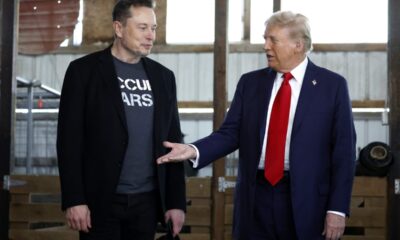
 News1 month ago
News1 month agoTrump returns to Pennsylvania for rally at site of assassination attempt
-

 MMA1 month ago
MMA1 month agoKevin Holland suffers injury vs. Roman Dolidze
-

 Sport1 month ago
Sport1 month agoAmerica’s Cup: Great Britain qualify for first time since 1964

You must be logged in to post a comment Login